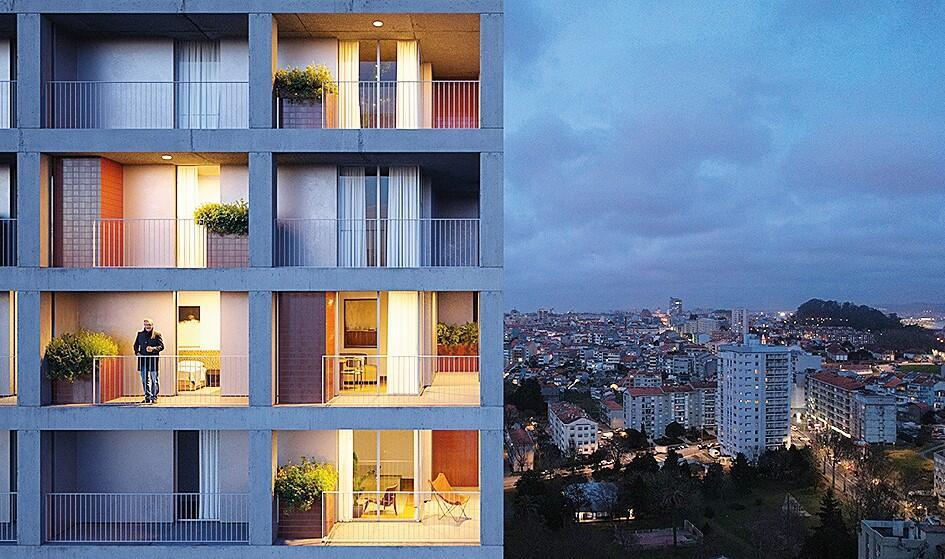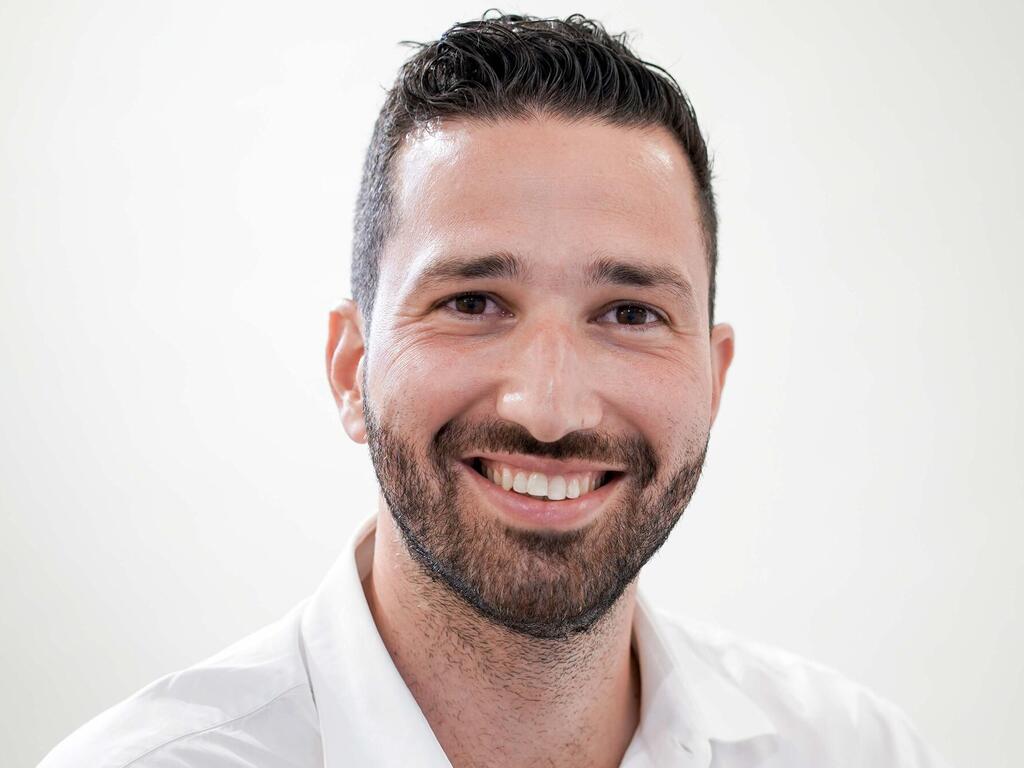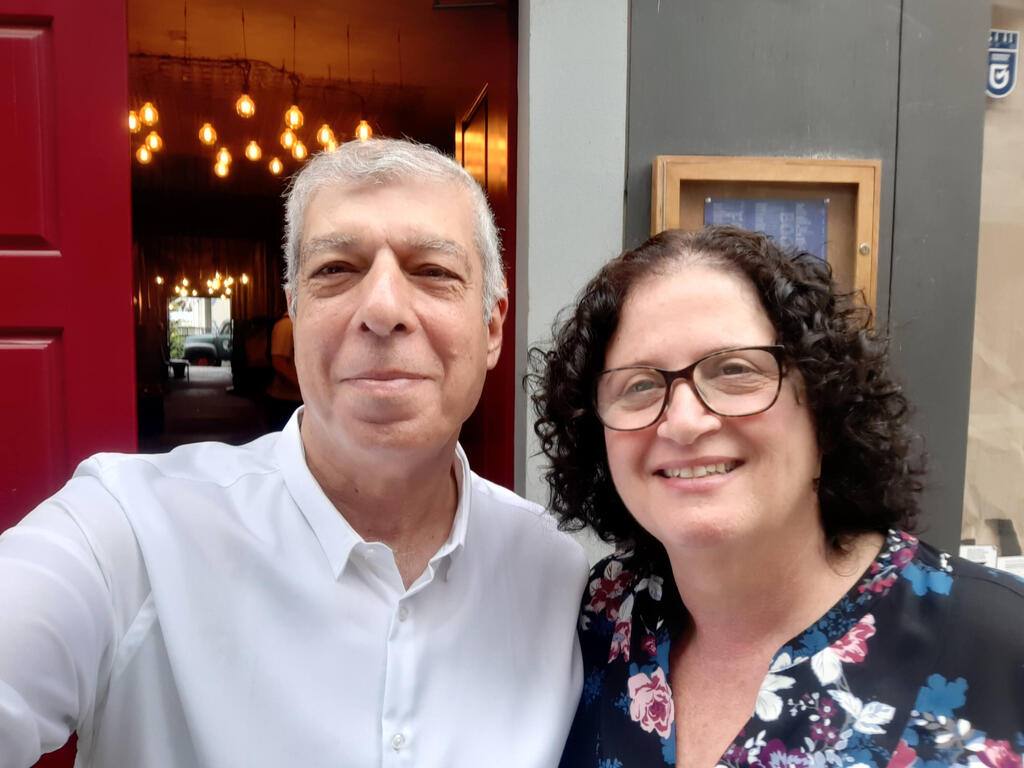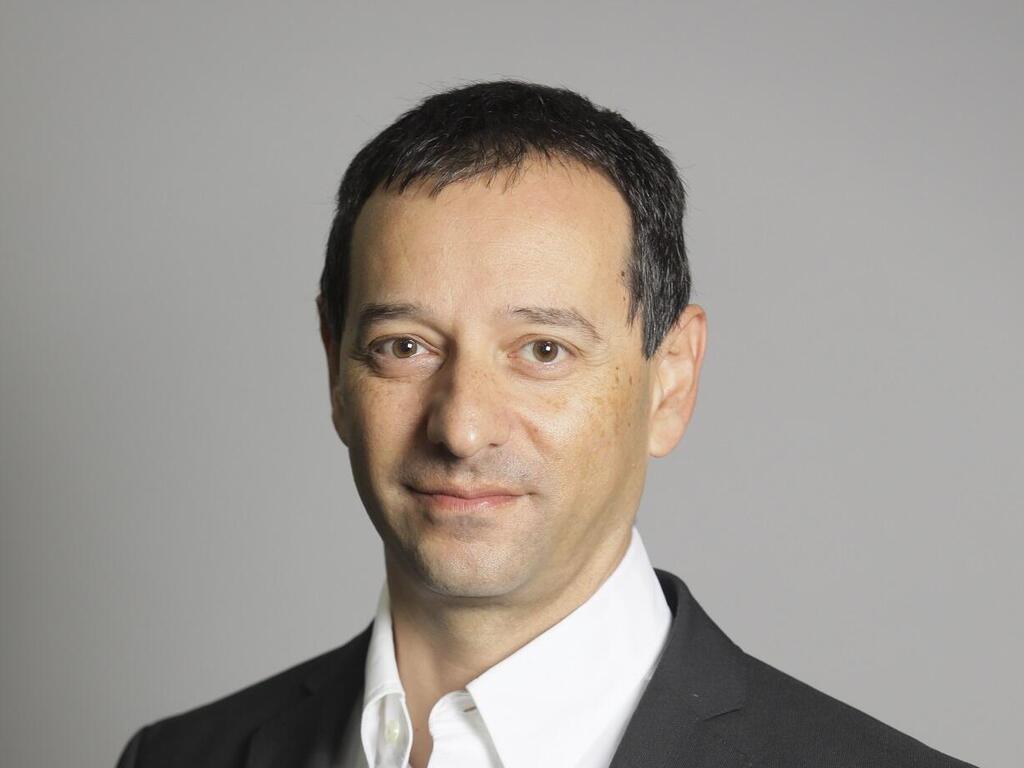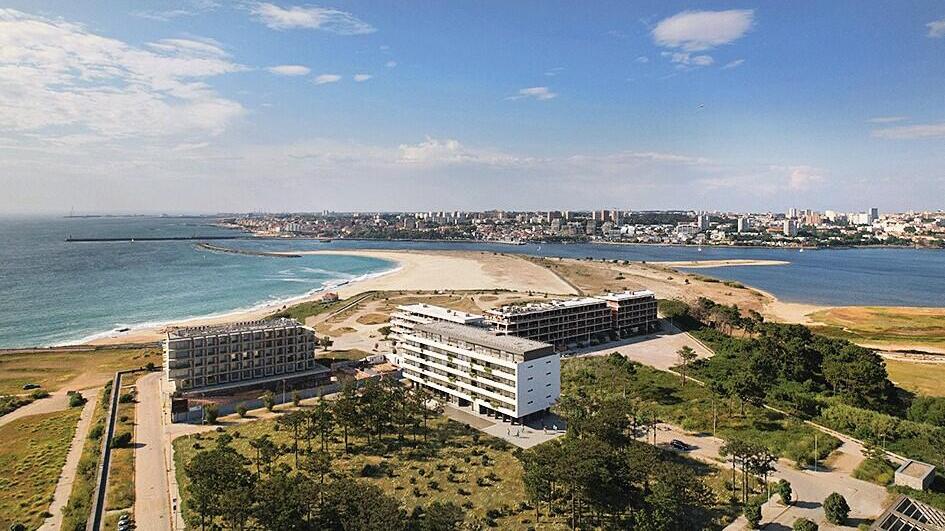Getting your Trinity Audio player ready...
The numbers are amazing. Take for example buying an apartment "on paper" for a million shekels (approx. USD 272,000), getting up to 75% mortgage at an interest rate of less than 4%, start repaying the loan only when the apartment is handed over, and then rent it out at a 10% yield, or more.
Portugal is no longer as cheap as it used to be, but it is still attractive to Israeli investors of all kinds, not just businessmen or young people. But there are high taxes involved in such purchase, and the economic situation may slow down the increase in apartment prices
The high apartment prices in Israel, encouraged us to look for an apartment at an affordable price, this time in Portugal. Portugal experienced house prices rising in recent years, and therefore the Portuguese government has launched a program to fight it.
However, as we learned from real estate professionals and apartment buyers, Portugal is still particularly alluring to Israelis, with Lisbon and Porto being the main cities of interest. Portugal has quite a few advantages for property buyers, but it also poses risks.
"My involvement in Portugal began in 2016, at a time when the country was just starting to flourish after it was hit with a major economic crisis in 2012; the year 2015 was marked with a turning point, as it became an opportunity. I walked around Lisbon and Porto and the amount of cranes was extraordinary, to the extent that you could literally hear the noise of construction in the streets; you could just close your eyes and imagine the direction it was heading'' - this is how Adv. Amir Talmi, CEO of Youropa Real Estate Portugal from the Youropa Group, describes the period that led him 4 years later to team up with Adv. Yossi Yitzhak, CEO of the group, and engage in real estate investments in the country neighboring Spain.
"At first, I didn't even think about initiating investments, I only planned to purchase. Then I happened to meet Yossi there, and the rest is history," he says.
Back then, Yitzhak came to Porto to establish the group's real estate agency in Portugal. ''Amir joined us and became the group's spearhead in Portugal,'' he recounts. ''He has a very strong connection to the place, he knows everyone, from the mayor to bank managers; at Christmas one of the bank managers brought him cookies for the holiday."
''We create partnerships with the locals, so we can manage everything remotely, like opening a bank account, signing the mortgage documents and handing over the apartment. We managed to create a mechanism that spares buyers the trouble of coming here physically", says Talmi.
40% increase in value
Youropa Real Estate was founded 5 years ago by four partners: Adv. Talmi, who leads the real estate marketing and sales activity in Portugal; Adv. Yitzhak, Chairman and CEO of the Youropa Group; Architect Assaf Molcho who leads the real estate entrepreneurship in Israel, and Adv. Gabi Jubran who leads the entrepreneurship activity in Portugal through Gaya Capital – the real estate development company of the group in Portugal.
Youropa Real Estate holds a portfolio of 657 real estate assets in 86 projects in Portugal, with an investment volume of over 164 million euros. The company offers a comprehensive service package for investors, which includes identifying the potential asset from a variety of the company’s existing projects, matching financing and mortgage solutions, and offering complementary services both during the purchase stage such as interior design, and after handover by leading property management, say Talmi and Yitzhak.
"We work only with leading, professional, and known local contractors in Portugal," says Talmi. "The market in Portugal is lagging behind Israel on many levels. In Israel, for example, there are caveats and the Sales Law, which do not exist in Portugal. Portugal a semi-innocent place, and we make sure to safeguard our investors' interests, providing trustworthy service to sign a deal."
"Portugal is one of the only countries in the world that welcomes foreign national buyers, where even non-residents can receive a mortgage of up to 75% of the property value, depending on the buyer's solvency. The price of the apartment is not linked to the consumer price index. Buyers are required to make a deposit of 25% of the purchase price.
The price doesn't change even if there is a spread payment of 20%-80%. If you buy an apartment "on paper" for 250,000 euros, its price will remain 250,000 euros also over a span of two years when it is delivered to you, and you will not have to add money — but its value will rise to 350,000 euros, says Yitzhak.
"In many of our transactions, the appraisal for an apartment reflects a price increase of 20%, sometimes even 40% or more. Thus, for example, a 2-room apartment in the heart of Porto which was purchased in April 2022 for 260,000 euros was valued by the mortgage bank appraiser upon its delivery in October 2024 at 415,000 euros.
Rent prices are also soaring, i.e. a 3-room apartment in the Porto metropolitan area purchased in 2021 with an expected rent of about 1,000 euros per month was rented out upon its delivery in mid-2023 for 1,450 euros per month."
How does this price increase affect the locals?
"In 2018, there was a relatively calm protest by young Portuguese couples who were unable to buy an apartment in the center of Lisbon", says Talmi. "I remember talking to a local about it, telling him that young couples don't buy an apartment in the heart of Manhattan, London, or Tel Aviv either.
The locals understand that this is an economic interest, and investors don't deprive them of opportunities, but rather the opposite is true. I hope that as Israelis we will know how to maintain healthy relationships with the Portuguese. The locals embrace us, and there is also a Jewish history here.
When the Gaza war started, we were anxious, but we feel very safe here today, speaking Hebrew on the street. One of the entrepreneurs we work with allocated an entire apartment hotel to Israeli families who were evacuated from the attacked Kibbutz Be'eri; it was an amazing gesture. The security situation in Israel led to a crazy increase in the number of Israelis who moved here; on a personal level it saddens me that so many families left Israel."
"An unbelievable interest rate of 0.9%"
So, who is buying property in Portugal? Americans and Northern European residents are the most numerous buyers for a property in Portugal. Quite a few celebrities, such as Madonna, actress Scarlett Johansson and French footballer Eric Cantona also purchased apartments there.
"As far as Israelis are concerned, in the beginning the buyers were mainly tech employees in their 30s and 40s, but as time goes by, the market is changing, and today, we also sell to 70-year-old retirees who don't need financing", says Talmi. They don't come only from Tel Aviv, but also from the Gaza Strip communities. I'm originally from there."
"We also had a group of high-ranked CEOs in the Israeli economy, some of whom run listed real estate companies, who have purchased several apartments from us, including for their children", adds Yitzhak.
One of the most appealing cities among Israelis in recent years is, as mentioned, Porto, the picturesque port city and the second largest city in Portugal, after Lisbon, which is considered the capital of northern Portugal with about 1.7 million inhabitants. Porto is one of the oldest European cities, large parts of which have been classified by UNESCO as a World Heritage Site. It is also considered one of the most visited cities in Europe in general and in Portugal in particular, and according to data, it hosts over 90,000 students.
Vila Nova de Gaia, a municipality in the Porto district, is also very popular among real estate investors and is considered as world center for Port wine industry.
R. (40), from central Israel, married and engages in high-tech, purchased no less than 23 apartments for investment in several projects in Porto: "During the COVID pandemic, I flew to Portugal and there were lots of business opportunities. In 2021, the apartments were much cheaper than today. I purchased studio apartments, which consist of one-bedroom, as well as two-bedroom apartments. I have properties in the old city, 3 garden apartments right next to the Clérgios church in Porto, houses in the fishing town Matosinhos next to the ocean, and also near Bolhão Market in Porto."
The financing terms of the loan that R. took were also remarkable: "The interest rate in Europe at that time was negative, so I obtained a mortgage at an unbelievable interest rate of 0.9%. For comparison, in Israel the mortgage interest rate today ranges from 6% to 10%."
"Four years later, the interest rate in Portugal also rose, but only to around 3%. I invested approximately 200,000 shekels (about 55,000 USD) in each apartment and received 75% financing for the rest of the amount, so in the end I actually paid about 5 million shekels (about 1.4 million USD) for 23 apartments in Porto, whereas in Tel Aviv you can buy only one apartment for that price, and maybe two apartments in Ashkelon (in southern Israel). Of course, it all depends on your repayment capacity, and subject to the approval of the banks in Porto."
What about the rental yields?
"The yield ranges between 10% and 12%, because I rent out for both short and medium term (between 30 days and 9 months). The rental price varies according to the season, where there are months when the rental income pays for the mortgage, and there are months when there is a profit", recounts R.
"I handle it with a local management company that is traded on the stock exchange. So far, I have sold only one apartment, and I'm waiting to see how the market develops, because eventually it will reach its maximum. I recommend buying property through proven experienced professionals rather than buying alone, because there are many swindlers out there, including Israelis, telling stories about their projects, but in reality, they do not have a building permit. I bought through Youropa Real Estate, and also used the service of an external local lawyer whom I was recommended", added R.
Yarden and Noam (30), newly-weds from Tel Aviv, recently purchased two apartments "on paper" consisting of one bedroom and a balcony in Porto. "We considered buying either an apartment in Holon in central Israel for about two million shekels (about 554,000 USD) or an apartment in the outskirts (in Israel) for a lower amount," says Yarden. "Eventually, we started looking at alternatives abroad. We have friends who bought apartments in Greece, which turned out to be a great investment, but then we discovered that in Portugal the leverage is much higher, as you get 75% financing in Porto alongside surging rental prices, and an almost constant increase in value."
"There are also downsides, such as the taxation rates, but what tipped the scales for us was the leverage, and the mortgage repayment, which was considerably lower compared to Israel," adds Yarden. "In Israel, the mortgage would cost us twice as much. In Porto, it is lower, because the interest rate is lower."
"In addition, the mortgage in Portugal is only taken out upon the property's handover. In Israel, you often pay both the mortgage and the rent until the project is ready. It is indeed stressful to buy an apartment "on paper", but unlike the situation in Israel, in Portugal the entrepreneur purchases the land in advance, even before the sale, without getting financing from the bank, which means that only resilient developers build there."
Where did you buy the second apartment?
"After we bought the first apartment we were very enthusiastic, so we bought another one in Porto. The first one is in a luxurious, high-standard building with facilities, which cost us 350,000 euros, and the second one is in an elegant, boutique-style building that cost 310,000 euros.
The rental yield in the smaller project is expected to be around 1,500 euros per month, and in the other project around 1,600 euros. The monthly mortgage repayment will be around 900 euros for each property, which means a positive cash flow; but what interests me most is the property improvement.
"We know that a new high-speed rail line between Madrid and Lisbon and from Porto to Lisbon are planned to be built, which will entail an increase in the value of all the properties there", he adds.
Lisbon, the capital of Portugal, is also highly popular among Israeli investors. It is the largest city in the country, it serves as a central hub for culture and economy. Both Lisbon and Porto are planning a significant public infrastructure investment, which will include paving roads and expansion of the metro network, along with the construction of high-speed trains. Other places of interest are the Algarve, Cascais, the Douro River region and Braga.
Shamir and Elia Shoval from Israel, both retirees, parents of 3 children, recently received the key to a rooftop studio apartment that they purchased in Lisbon. "I felt that the money in Israel was running out, so 4 years ago I decided to look for a property abroad and bought a charming 40 sqm. apartment in a preserved building in Lisbon, for 210,000 euros," says Shamir. "I had to pay quite a bit of taxes, but I was able to do it. Today the apartment is estimated at about 325,000 euros. I could rent it out at 1,110 euros per month, and pay a considerable tax to the municipality, but in the meantime, we decided to use it ourselves, turning it into our vacation/getaway apartment."
Overtaking France and Italy
Portugal has a population of about 10.6 million inhabitants and is characterized by a stable labor market. Unemployment is relatively low compared to European Union countries and stood at 6.8% in the first quarter of 2024.
According to Trading Economics, the inflation rate fell from 3.1% to 2.3% last year and is expected to be 1.9% in 2025. The interest rate is 3.5%. For comparison, the interest rate in Israel is 4.5%, and 5.3 in the U.S.
Portugal has been recovering from the 2023 economic decline, and in 2024 its GDP grew, leading to an upgrade of the country's credit rating. According to the International Monetary Fund, the economy grew by 1.7% at the end of last year and is expected to grow by 2.1% this year.
In order to attract foreign investment, the Portuguese government approved, among other things, a gradual reduction of corporate income tax by 2% per year, aiming to reach 15% by 2027.
The real income of Portuguese households per capita increased by 6.7% as a result of the increase in employment and wages, a trend that is expected to continue.
According to the World Travel & Tourism Council, the tourism market is expected to generate a revenue of approximately 40.4 billion euros in 2025. According to Global Property Guide, apartment prices rose up by 10.9% in the first quarter of 2024 from the corresponding period last year, thus overtaking the Netherlands, Spain, Switzerland, Italy and France.
According to a study carried out by the IFO Institute at the University of Munich, in Germany, which highlighted the forecasts of over a thousand economists on the future of the housing market worldwide, Portugal should see an increase of 8.2% per year in house prices over the next ten years. In the last 15 years, prices have climbed by a total of 73.5%.
11 View gallery


A project in Lisbon, where the Shovals purchased their apartment
(Photo: Family album)
Banco do Portugal (the central bank of Portugal) reveals that foreign direct investment in Portugal in July-September 2024 totaled more than 1.1 billion euros — an increase of 26% compared to the same period last year.
The Portuguese government aims to utilize 23 billion euros of European funds by 2027, to stimulate and develop the Portuguese economy as part of the "Portugal 2030 plan".
Portugal is expected to co-host World Cup in 2030, which is estimated to generate 800 million euros for the local economy.
The previous government tried to combat price increases through a number of decisions and decrees, including restrictions on short-term rental licenses. The new government has introduced a new decree-law that will revoke some of the short-term rental restrictions, and the power to make decisions on licenses will be given back to municipal councils, while balancing local needs and tourist needs.
Golden Visa Revised
Of course, there are other players operating in the field of real estate investments in Portugal. One of them is the global real estate giant JLL, which has been operating there for 30 years.
For the first time, JLL, is opening its property portfolio in Portugal to private investors from Israel. The company, which was founded 240 years ago and operates in more than 80 countries, has so far worked in Israel with giant global companies and institutions that make investments worth hundreds of millions of shekels. Now it will also allow private investors to invest in its portfolio, which includes over 5,000 properties in Portugal.
"We are not developers, we market projects for developers. The innovation here is that a private investor can also benefit from the standards required by, for example, a pension fund," says Mor Ziv, Head of International Capital Coverage at JLL Israel.
"In recent years, Portugal has established itself as one of the leading investment destinations in Europe, thanks to a unique combination of political and economic stability, high quality of life and a favorable taxation system for foreign investors," says Ziv. "Despite a slowdown in 2023, this year Portugal ranked 7th globally in the Global Peace Index (GPI), and according to the annual report by PwC and the Urban Land Institute, Lisbon ranked 8th as the most attractive European city to invest", she adds.
11 View gallery


Mor Ziv, JLL Israel: "Portugal has established itself as one of the leading investment destinations in Europe"
(Photo: Lina Miara)
According to JLL analysis, there has been a 6.7% increase in household transactions in the third quarter of 2024 compared to the second quarter. The national average cost per square meter for houses in Portugal sits at 2,284 euros, the region with the highest average value was in Lisbon at 3,129 euros per square meter, The Algarve followed at 3,080 euros per square meter and in Porto at 2,464 euros per square meter.
Yehonatan Gourvitch is founder and CEO of Casa Portugal, part of the YGI Group (which holds real estate assets in Portugal), which he founded alongside his brother Gideon Gourvitch. He has been involved in entrepreneurial activity in Lisbon for about 13 years, mainly vis-a-vis investors from Israel and Brazil.
"It should be noted that taxation on real estate investments in Portugal is high", explains Gourvitch, "but buyers are attracted by the relatively low price of the properties, the bank financing options and the low interest rate. For comparison, in Greece there is no bank financing. In Portugal, it is worth taking out a mortgage of even 40%, even if there is no such need, because beyond providing the necessary funds, the Portuguese banks conduct thorough legal checks and valuations and essentially act as a local partner that confirms the feasibility of the investment.
11 View gallery


Yehonatan Gourvitch, CEO of Casa Portugal: "Note the taxation"
(Photo: Ricardo Viola)
"If the investment is purely economic, it is worth focusing on the suburbs of the big cities, especially Lisbon. Small or too remote cities will not be suitable in that case, because it may be difficult to rent out the apartment," he continues.
"On the other hand, in the centers of the big cities, apartments are no longer cheap, thus lowering the yield. A relatively high yield with relatively low risk can be found either in the metropolitan area of Lisbon, such as Almada, Barreiro and Setúbal, or in Vila Nova de Gaia in Porto."
And for those who want to buy a property for vacation purposes?
"In that case it is recommended to fly to Portugal and visit the apartment yourself. Remote property purchase is easier today than ever, as there is a local team that can take care of everything; so, when it involves a financial investment, it makes sense. But when the goal is different, no team, even the most skilled, can fall in love with a property instead of the investors themselves."
In addition, "the Portuguese real estate market has matured", he emphasizes, "and today, in most cases, you have to hold a property for no less than 5 years until there is a significant increase in value. I recommend buying a second-hand property over a new-built property, since the returns on new apartments are lower.
Moreover, long-term rentals are preferable to short-term rentals, since profitability and returns are measured in years, not months. Stability, low wear and tear, and low management costs often prove to be more profitable in the long term."
Gourvitch says that his company provides services for obtaining a Golden Visa for those who are no longer eligible for a Portuguese passport. "Until now, anyone who bought real estate could get a Golden Visa. Since the end of July 2024, this has changed and today in order to qualify for Portugal’s Golden Visa, a qualifying investment of a minimum 500,000 euros has to be made, such as in venture capital fund in Portugal, or in a company formation, which employs a number of local workers, with an investment of about half a million euros."
"For over a decade, many Israelis have been seeking Portuguese citizenship as the Portuguese government allowed the descendants of Sephardic Jews who were affected by the 1492 Inquisition to apply for Portuguese nationality", states Gourvitch.
"This option is no longer available, but there are other visa options available, such as Digital Nomad Visa, Entrepreneur Visa (investment in a new business), and as mentioned, a Golden Visa, which is a temporary residence permit for 5 years through an investment in the country, which does not require a long-term stay but only one week a year."
The difference between Lisbon and Porto
As mentioned, purchasing real estate in Portugal poses also risks. As explains Doron Gibor, an audit partner and Head of the real estate industry at Deloitte Israel: "In 2023, the market performance of the residential sector was significantly impacted by the challenging macroeconomic environment prevalent in Portugal, including an uncontrolled inflation and unexpectedly high interest rates, alongside local regulations such as the "Mais Habitação" package, and the end of the Golden Visa program. These have led to a decrease in both the quantity and magnitude of residential property sales, when compared to 2022."
On the positive side, the Portuguese government recently announced measures to support young homebuyers, offering exemptions from IMT (property purchase tax) and Stamp Duty for first homes up to €316,772, alongside a public guarantee of up to 15% of the acquisition value. These measures are expected to help young people."
"The average mortgage interest rate has increased from 1.1% in 2022 to 3.6% in 2023. This will significantly increase the cost of purchase, and together with high inflation, it may stop or even reverse the rise in housing prices. Therefore, when purchasing apartments in Portugal, the return should be examined in relation to the cost of financing and to consequences of government intervention in the market."
In recent years, adds Gibor, the housing market in Portugal has been fueled by demand from foreign investors who relied on facilitated immigration rules and tax breaks for foreign residents. "It must be taken into account that these reliefs have been canceled, and this is expected to have an impact on demand and, accordingly, on apartment prices.
The local and international taxation must be taken into account to calculate the net return. Finally, Lisbon and Porto are cities with different real estate markets. Porto recorded growth in housing prices higher than Lisbon in recent years. As long as the strong demand in Porto continues, thus contributing to the continued rise in apartment prices, the rental yield will be impaired, and will get closer to that of Lisbon, which is currently 15%-20% lower than in Porto."
A Guide to Real Estate Taxes in Portugal
Israel and Portugal signed a tax treaty that anchors the tax relations between the countries, which in effect prevents double taxation. Adv. Doron Mutai, partner and head of the IL tax practice group at 'Pearl Cohen Israel' law firm, specializing in international taxation, explains that in the case of a resident of Israel who generates taxable income in Portugal, a prior taxation right will be given to Portugal. It involves usually rental income tax, municipal taxes, capital gains tax, or various real estate taxes when the property is sold, and sometimes additional taxes such as VAT.
Israel, the investor's country of residence, will have the secondary right to tax that income, that is, to collect additional tax, if necessary, in accordance with Israeli law.
"Current income from the rental has two taxation tracks: a standard track like in Israel, in which the expenses related to the property and its operation will be deducted from the rental income, and only the remaining profit will be taxed, which will be paid in Israel. From this tax, it is possible to offset the income tax paid in Portugal, but it is not possible to offset the VAT or municipal taxes paid. This track is particularly attractive when there are high expenses on the property, which can be deducted from the taxable income.
"The second route, which applies only to individuals and not to businesses and companies, is a tax payment of 15%, in Israel, on gross rental income less depreciation – without the possibility of offsetting expenses, and without crediting the tax paid in Portugal.
Since the provisions of the tax treaty prevail over the provisions of the Income Tax Ordinance, in this context it may be possible to request a credit/deduction for the tax paid in Portugal, in accordance with the treaty. This route would be suitable for those who are subject to a high marginal income tax rate, and/or who do not have significant expenses on the property.
Moreover, there may be other tax liabilities in Israel, such as National Insurance and surtax (mainly when selling the property in Portugal)."
The purchase tax is paid in Portugal only, upon delivery of the apartment (unlike Israel, where it is paid when signing the purchase agreement). It varies depending on the property's value and purpose of use (main residence or investment). It is a progressive tax, which means that its rate increases as the price of the apartment increases. For properties worth up to 92,407 euros, there is no tax. Beyond that, the tax rate increases gradually. Properties used for investment purposes, or luxury apartments, are subject to a higher tax.
Rental income tax varies depending on the type of rental (short-term or long-term). The tax on short-term rental is 8.75% of the income. The tax on long-term rental is 10%-25% (the longer the rental period, the lower the tax rate), and some of the expenses and costs (management fees, maintenance, etc.) are deductible.
Get the Ynetnews app on your smartphone: Google Play: https://bit.ly/4eJ37pE | Apple App Store: https://bit.ly/3ZL7iNv
If the owner of the property is a resident of Israel, tax should be paid on the rental income in accordance with the rental taxation track he chooses in Israel.
Adv. Racheli Guz-Lavi, a managing partner at Amit Pollak Matalon & Co. law firm, and part of the Tax department, lists the various tax rates applicable to the purchase and renting out of an apartment in Portugal:
• Property Purchase Tax (IMT): a tax paid by the buyer depending on the type of property. For residential property – up to 7.5%.
• Stamp Duty: The standard rate for property purchases is typically 0.8% of the purchase price. For other forms of free acquisition of goods (including both gifts and inheritances), the Stamp Duty rate is 10% (there are certain exemptions for close family members, including spouse, descendant or parent).
• Capital Gains Tax: Refers to the profit from the property's sale by a non-resident individual, at a rate of 28% of the profit. Starting in 2023, the tax will apply only to 50% of the capital gain, and its rate will be between 13% and 48%.
• Municipal Property Tax (IMI): an annual tax based on the TRV which is the assessed value of the property determined by the tax authorities. Municipal real estate will be subject to a property tax of 0.3%-0.45% of the TRV for urban property.
• Additional to Municipal Property Tax (AIMI): Applies to a property worth more than 600,000 euros. Rates are between 0.7% and 1.5%.
• Rental Income Tax: 28% of net income, for rental agreements signed until October 2023. For agreements from then on – 25% (subject to certain conditions).



